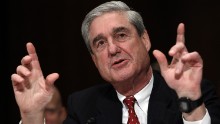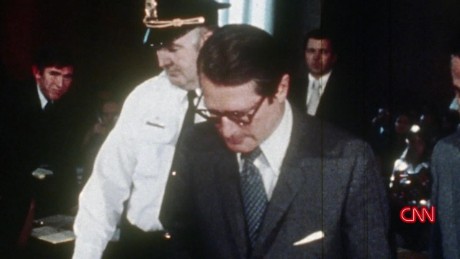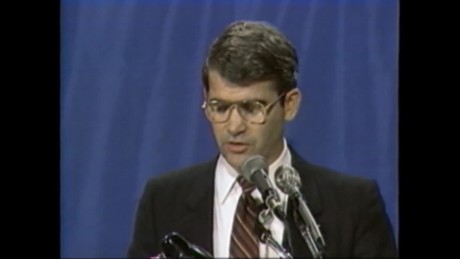Which is the greatest 'witch hunt' in US political history?
(CNN)President Donald Trump is irate, again, about special counsel Robert Mueller, and complaining about the yearlong "witch hunt" he feels is out to get him.
It wouldn't be just any witch hunt out to get Trump, who likes things associated with him to be bigger and better, but rather the "greatest Witch Hunt in American History. ..." (Great means big here, not good.)
The anger of powerful politicians at the indignity of investigations is in the genes of American politics and on both sides of the family, Republican and Democratic.
Trump shares the term "witch hunt" with Richard Nixon, who was reported to have used it about Watergate hearings.
He shares the sentiment of partisan paranoia with Hillary Clinton, who complained of a "vast right-wing conspiracy" during an earlier special and independent investigation that crept on.
On Thursday, the one-year anniversary of Mueller's appointment to investigate Russia's election meddling and possible collusion with the Trump campaign, the President was being ironic when he clapped for the man he sees as his nemesis.
Congratulations America, we are now into the second year of the greatest Witch Hunt in American History...and there is still No Collusion and No Obstruction. The only Collusion was that done by Democrats who were unable to win an Election despite the spending of far more money!
"Congratulations America, we are now into the second year of the greatest Witch Hunt in American History ... and there is still No Collusion and No Obstruction. The only Collusion was that done by Democrats who were unable to win an Election despite the spending of far more money!"
Applying Trump's term to all special investigations curated by the National Archives and measuring them by time alone, Trump's would not yet be the greatest witch hunt in American history.
Turns out that witch hunts drag on for years and years. And years.
One complaint about the Mueller investigation is that it appears to have followed lines away from its original mandate on collusion.
That's also a trait shared by those other two most notable special investigations, which after years of work led to Nixon's resignation and President Bill Clinton's impeachment. There are differences, obviously, in terms of alleged wrongdoing, the laws -- now lapsed -- under which special prosecutors were appointed and other things.
But objectively speaking, five of the last nine presidents -- including Trump -- have been ensnared somehow in drawn-out independent investigations, assuming that the Iran-Contra affair also touched George H.W. Bush. There was a boom of smaller independent investigations into a number of Reagan administration officials. But each of the big investigations that bear some resemblance to Mueller's lasted years from start to finish.
Kenneth Starr, the nemesis of Clinton leading up to his impeachment, was one of three people to fill the role of independent counsel investigating him. The Whitewater probe largely wrapped with the publication of the Starr report and his recommendation that Clinton be impeached, but the office carried on for years, issuing reports years after Clinton left office in 2001.
The National Archives has documents from that investigation that span a decade and represent 3,149 cubic feet. Yes, apparently they measure these things in cubic feet, as in a foot-tall box of foot-long file folders. The Whitewater investigation was first empaneled in 1994, the second year of Clinton's presidency, and extended for years past his impeachment and subsequent acquittal in the Senate in 1999.
The "Watergate Special Prosecution Force," as the Archives calls it, lasted a mere six years and spans 1,362 feet. Much smaller. Nixon took office in 1969, and Archibald Cox was empaneled a few months after Nixon's second inauguration in 1973. Nixon later fired Cox in the infamous "Saturday Night Massacre" rather than turn over tapes of White House conversations. But the investigation continued and the Supreme Court later made Nixon turn over the tapes anyway. He resigned in August of 1974, well more than a year after Cox was first appointed. The Watergate force didn't end until 1977, after four people had served as prosecutor. Read Bob Woodward's epitaph for that office from June of that year.
The other major probe on the National Archives list of independent investigations is the Iran-Contra affair, which has records spanning seven years, long after the essential end of the hearings and prosecutions and even after then-President George H.W. Bush pardoned some of the people who were convicted as a result. The documents stretch to 1,948 cubic feet.
In 1994, the final report was issued by Iran-Contra special prosecutor Lawrence Walsh.
The New York Times summarized the event on January 19 of that year:
"After a seven-year legal odyssey, the Iran-contra independent prosecutor published his final report today, finding no credible evidence that President Ronald Reagan had broken the law but concluding that Mr. Reagan had 'knowingly participated or at least acquiesced' in covering up the scandal."
Somewhat incredibly, it was a day after that story ran, on January 20, that Bill Clinton's attorney general, Janet Reno, announced the appointment of Robert Fiske as the precursor for the special counsel role that would ultimately become the Whitewater investigation.
The greatest witch hunt competition is fierce.
CORRECTION: This post has been updated to reflect it was the Whitewater investigation that began in 1994.





















No comments:
Post a Comment